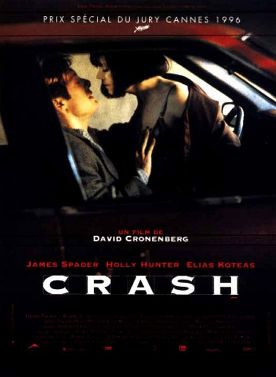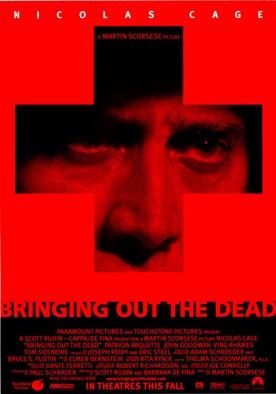Crash
Movie illnesses used to be the kind of thing that beautiful young women contracted. The silent killer was sure in its work, but it always left them looking in the pink when they finally breathed their last. They were still beautiful, but now also charged with pathos. Looking on them you might says, as Romeo said of Juliet (who in fact was not dead) that “death’s pale flag is not advancèd there. Whatever killed them was like Hamlet’s “impostume” which bursts inside you and “shows no sign without why the man dies.” Above all, movie illnesses did not disfigure. Even bullet wounds did not disfigure until the pioneering work of Arthur Penn and Sam Peckinpah.
Nowadays, however, movie illnesses are designed specifically to disfigure. Not necessarily physically, but morally. In Crash by David Cronenberg, both physical and moral disfigurement are involved, but the illness that afflicts this bunch of sickos who get a sexual charge out of car crashes is no less a movie illness for that. It has the essential characteristic of a movie illness, which is that people in the real world rarely if ever get it. The idea of getting excited by car crashes just wouldn’t occur to average people. It is the kind of idea that only occurs to movie people. Why? Because they know that there is a significant segment of the movie audience that likes to watch perversions as a vicarious way of stretching the envelope. Crash is, in short, pornography for a select audience: intellectual sensualists.
James Spader plays James Ballard (J.G. Ballard was the author of the book on which the film is based), a film producer or director who smashes up his car, killing the driver of the car he hits and severely injuring both himself and the other man’s wife,. Ballard and his wife, Catherine (Deborah Kara Unger) are already into some kinky sexual stuff. They both screw other people and then come home and tell each other about it. But the car crash adds a whole new dimension to their lives, especially after Ballard meets up with the widow of the man he killed, Dr Helen Remington (Holly Hunter), and they find that they have, um, a lot in common, including a taste for watching re-enactments of such historic car crashes as the one that killed James Dean.
They are introduced to this amusement by a man named Vaughan (Elias Koteas), who is the philosopher of crash-fetishism. With his almost completely silent girlfriend Gabrielle (Rosanna Arquette)—who has been so banged up in a wreck or wrecks that she wears metal braces on both legs as well as her back—Vaughan’s purpose (he tells James) is “the reshaping of the human body by modern technology.” Already, Gabrielle is already half woman, half machine. This makes her sexy to both Vaughan and James, who is learning from his new friend that “There’s a benevolent psychopathology that beckons towards us” and that a crash can be “a fertilizing rather than a destructive event.”
Well, to coin a phrase, poppycock. But the paradoxical appeal of this kind of movie illness is that people seem prepared to believe in it precisely because they have never seen such a thing before. It is the nature of the movies to show us the exotic, and therefore, the more exotic the stuff they show us, the more sure we can be of its authenticity. That is why the jury of the Cannes Film Festival invented a whole new category of award to give it, based on its “audacity, originality and daring.” Of course, what would really be daring would be to show the illness not as an amusement for attractive but jaded sensualists but as the really messy kind of insanity that it would no doubt be in the real world. If you could find it.
Discover more from James Bowman
Subscribe to get the latest posts to your email.







